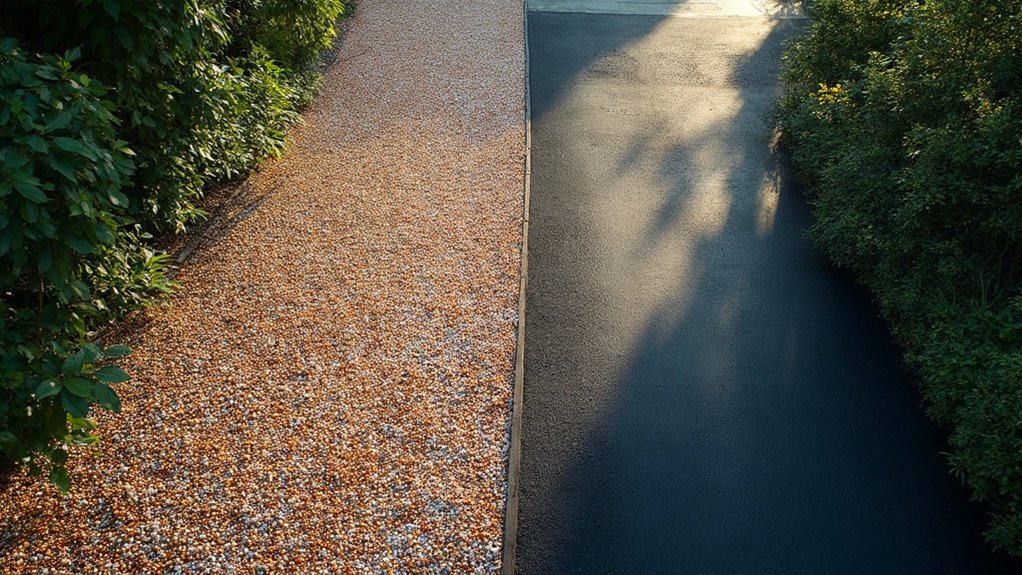Choosing between resin-bound gravel and tarmac boils down to three key factors: durability, cost and looks. Resin-bound surfaces typically last 15-25 years and cope brilliantly with British winters, whilst offering countless design possibilities to boost your property's kerb appeal. Though tarmac is cheaper to install, it only lasts 15-20 years and often needs repairs when cracks appear – a common sight on many UK driveways. For a smart, low-maintenance surface that handles our wet weather perfectly, resin-bound gravel is worth the extra investment. Think about how you'll use the space and your budget to make the right choice for your property.
Key Takeaways
Durability
Resin-bound surfaces give you 15-25 years of life with basic upkeep. Tarmac manages 15-20 years but you'll need to sort out repairs more often.
Weather Performance
British winters won't faze resin – it handles frost brilliantly and stays grippy in the rain. Tarmac tends to crack in the cold and can be quite dicey when wet, much like those tricky supermarket car parks.
Cost-Effectiveness
Whilst tarmac's cheaper to put down initially, you'll save more with resin in the long run. Think of it like buying quality boots versus cheap ones that need replacing every year.
Installation
Both need proper groundwork. Resin goes down quickly but needs 24 hours to set properly. Tarmac's faster overall but might need more prep work, especially on dodgy ground.
Aesthetic Appeal
Resin-bound gravel looks smart and boosts your property's kerb appeal – you can choose from loads of colours and finishes. Tarmac's a bit plain Jane, rather like standard black asphalt you'd see on any street.
Overview of Resin-Bound Gravel and Tarmac
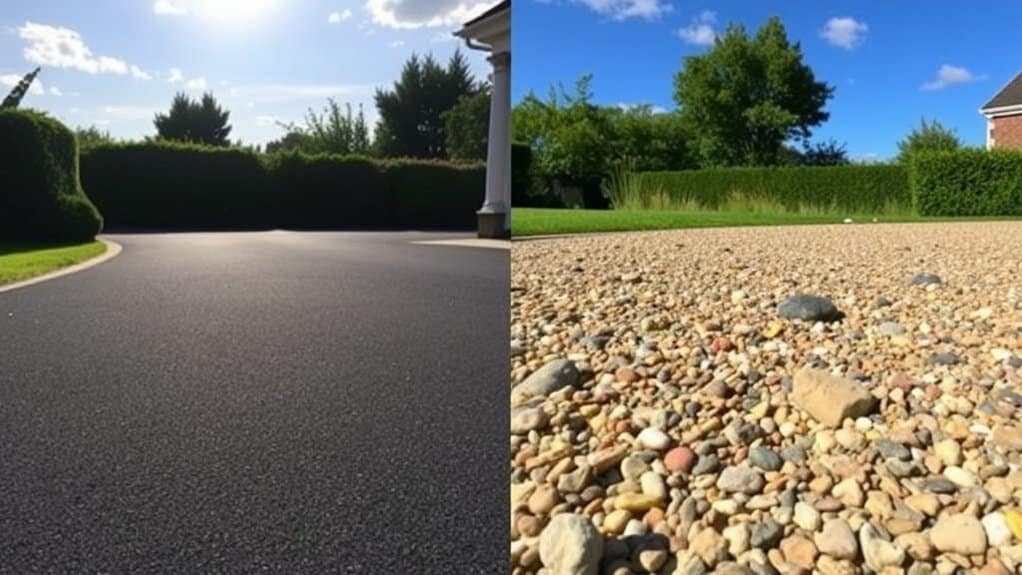
Choosing between resin-bound gravel and tarmac comes down to understanding their basic differences.
Resin-bound surfaces mix stone aggregate with clear resin to create a sturdy, water-permeable surface that meets UK drainage requirements. Think of it like spreading butter on toast – installers trowel the mixture for a smooth finish, and you can choose from plenty of colours. This type of surface is also highly permeable and eco-friendly, making it compliant with SUDS regulations. In addition, resin driveways serve British homes for a minimum of 15 years, often extending to 25 years with proper maintenance.
Tarmac, on the other hand, is more like traditional British roads – crushed stone mixed with tar. It's tough but offers fewer style options. You'll need heavy machinery to lay it properly, much like resurfacing a car park.
Both need a solid foundation underneath, but resin-bound gravel has two key advantages: it sets quickly and needs less upkeep over the years.
For your driveway or garden path, resin-bound gravel might cost more initially, but it's often worth it for the look and long-term benefits.
Durability Comparison
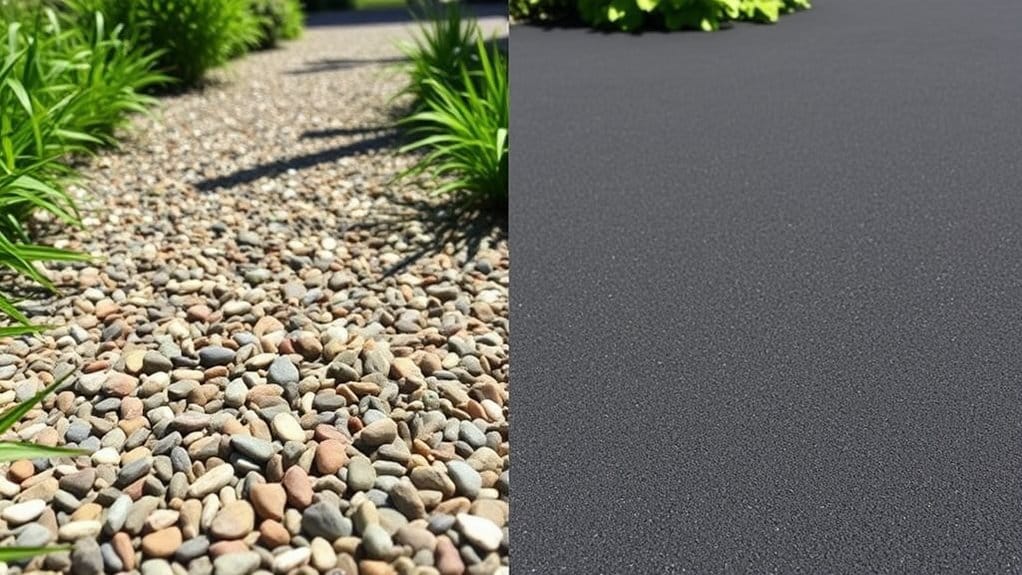
Resin-bound gravel and tarmac both offer solid durability, but each performs differently in real-world conditions.
The key factors affecting their longevity:
- Quality of resin: A premium resin ensures your surface won't deteriorate prematurely.
- Aggregate choice: Much like choosing proper building stones, selecting the right aggregate size and type is crucial.
- UV stability: British weather demands UV-resistant materials to prevent fading and breakdown.
- Proper installation: Think of it like laying a patio – the technique matters as much as the materials. Expert installation techniques are essential for ensuring optimal performance and longevity.
- Maintenance: Regular upkeep, such as cleaning and inspecting for damage, extends life expectancy. Additionally, selecting high-quality resins can significantly enhance the durability of your resin-bound surface.
Resin-bound surfaces typically last 20-30 years, outlasting tarmac's 15-20 year lifespan.
They also handle our freeze-thaw cycles better than tarmac, which often cracks during harsh winters.
Cost Analysis: Initial vs. Long-Term Expenses
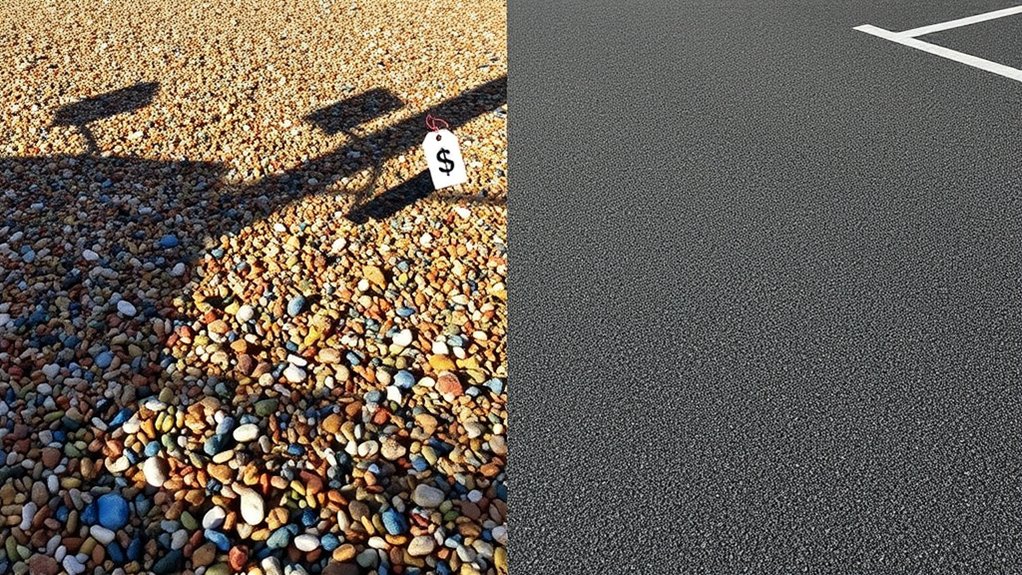
Initial costs for resin-bound gravel tend to be higher than tarmac – expect to pay roughly £40-£70 per square metre for resin compared to £20-£35 for tarmac.
However, tarmac often needs repairs every 3-5 years due to cracking and weather damage, whilst resin surfaces can last 15-20 years with minimal maintenance. Additionally, the use of UV stable resin can enhance the longevity and appearance of resin driveways, making them a more appealing long-term investment.
A typical UK driveway might cost £2,500 more upfront with resin, but you'll likely save that amount and more by avoiding frequent tarmac repairs and resurfacing jobs. Investing in a resin driveway benefits from proper surface preparation, ensuring a durable and effective installation.
The maths is clear: though dearer at first, resin proves more cost-effective for British homeowners in the long run.
Initial Installation Costs
Initial Installation Costs
Comparing resin-bound gravel and tarmac installation costs reveals significant differences for your budget:
- Resin-bound gravel: £6.50 to £9 per square metre all-in.
- Tarmac: Lower upfront costs overall.
- Resin materials: £3.50 to £5.30 per square metre.
- Labour for resin: Roughly 15 hours of work needed.
- Installation complexity: Resin requires more detailed work, similar to laying a patio.
Whilst resin-bound gravel offers better kerb appeal, tarmac's simpler installation makes it more cost-effective at the outset.
Think of tarmac as the basic but reliable option, much like choosing between standard and premium tiles for your kitchen floor.
Maintenance Expense Comparison
The financial impact of choosing between resin-bound gravel and tarmac deserves careful thought.
Resin-bound surfaces need minimal upkeep – just occasional power washing to keep them looking fresh. Tarmac, however, requires sealing every 2-3 years, much like maintaining a wooden fence.
When it comes to repairs, tarmac can hit your wallet hard. A cracked tarmac driveway often needs complete resurfacing, costing hundreds of pounds.
Resin-bound repairs tend to be simpler and cheaper – you can often sort minor issues yourself with repair kits from any DIY shop.
Whilst resin-bound gravel costs more initially, its lower maintenance needs make it cost-effective over time.
Think of it like choosing between a cheap kettle that needs replacing yearly versus a quality model that lasts ages – sometimes paying more upfront saves money in the long run.
Long-Term Value Analysis
Long-Term Value: Resin vs Tarmac
Comparing resin-bound gravel and tarmac goes beyond just the initial price tag.
Whilst resin costs more to install, it often proves the smarter investment:
- Maintenance Costs: Resin needs minimal yearly upkeep, unlike tarmac which often needs regular patching.
- Better Durability: Less prone to cracking, particularly during harsh British winters.
- Lasting Looks: Keeps its smart appearance longer than tarmac, which can look tired after a few years.
- Rain Management: Helps prevent garden flooding and puddles, meeting UK drainage requirements.
- Property Value: Estate agents often note that resin driveways boost kerb appeal more than standard tarmac.
Worth considering the bigger picture – paying more now could save plenty down the line.
Installation Process and Timeframes
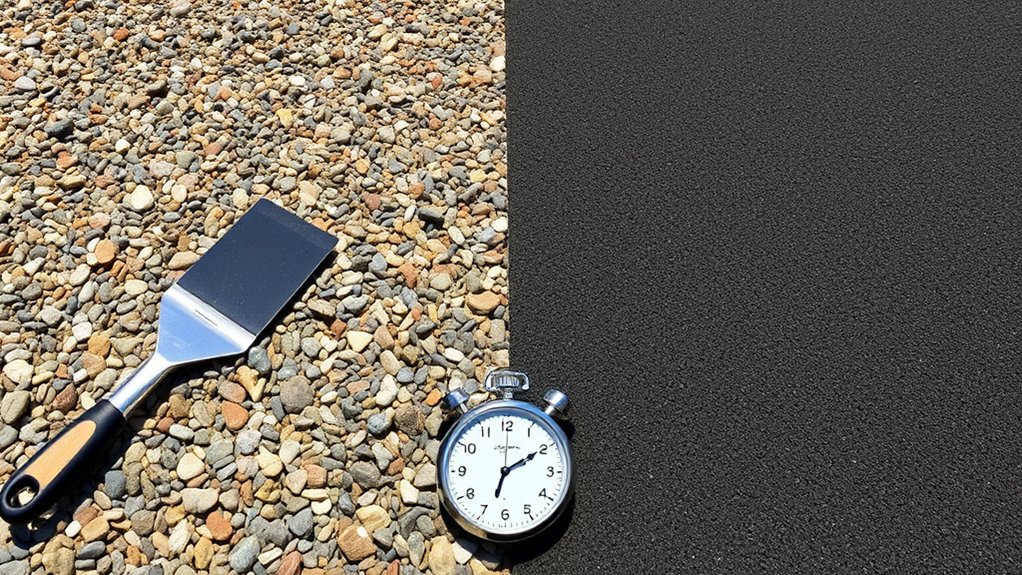
Resin-bound gravel and tarmac differ markedly in how they're fitted.
Resin-bound surfaces need thorough prep work – you'll need a solid, clean base, and concrete surfaces often need priming first. The tricky bit with resin is getting the mixture spot-on and laying it before it starts to set, which typically gives you just 20-30 minutes to work with.
Tarmac's more straightforward – contractors can usually lay it straight over your existing surface and wrap up the whole job in a day.
Whilst tarmac needs less faff with groundwork, you won't get the same range of colours and finishes you'd find with resin-bound gravel.
Before you can park your car or walk heavily on resin-bound surfaces, they'll need 24-48 hours to set properly.
With tarmac, you can use it almost straight away once it's been laid.
Customisation Options and Aesthetic Appeal
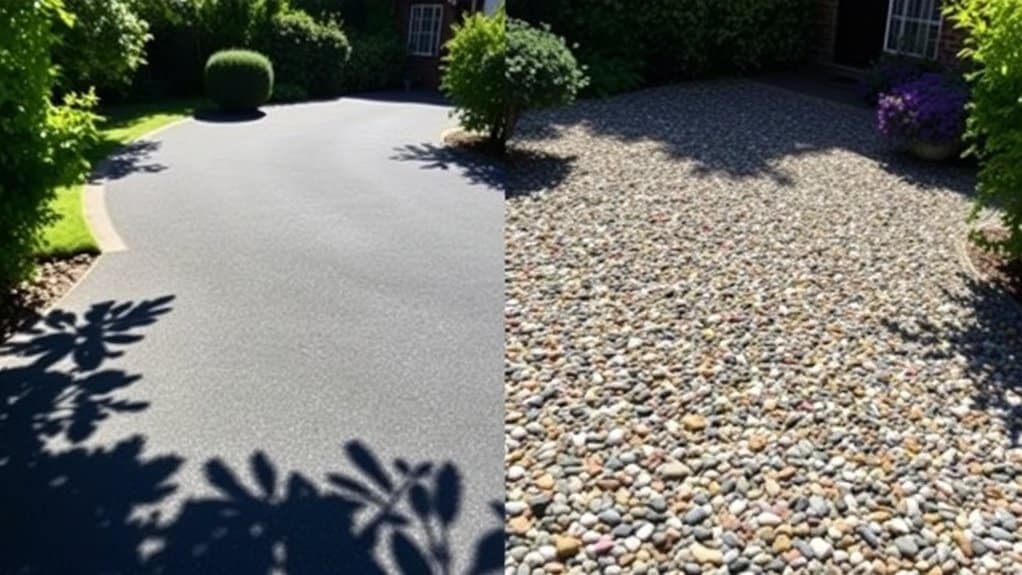
Customisation Options and Aesthetic Appeal
Resin-bound gravel offers exceptional design flexibility, turning ordinary driveways and paths into striking features. The system's adaptability lets you create truly personalised outdoor spaces with practical benefits.
Key customisation features:
- Varied patterns and textures to match your property
- Custom designs and logos for business premises
- Multiple aggregate colours for distinctive finishes
- Combination with other materials like stone or tiles
- Flexible shaping for curved paths and borders
Whether you prefer a sleek, modern look for your city home or a rustic finish for a country property, resin-bound surfaces adapt to suit.
The system works particularly well in British weather conditions, maintaining its appearance year-round whilst providing reliable drainage.
Practicality and Usability for Different Applications

Resin-bound gravel and tarmac each shine in different settings across the UK.
Resin can be laid straight over existing concrete or tarmac, making it brilliant for upgrading driveways or garden paths. Tarmac's quick-setting nature means you can drive on it almost immediately – perfect for busy car parks or school playgrounds.
Most British homeowners favour resin for its minimal upkeep and environmental benefits, though it costs more upfront. Think of it like choosing between carpet and laminate flooring – resin might cost more initially but requires less maintenance over time.
Resin handles our wet British weather brilliantly and stays looking smart for years. Tarmac suits high-traffic areas like shop forecourts but often needs patching up sooner.
Your choice really depends on the job at hand – a quiet residential driveway might benefit from resin's smart finish, while a busy industrial estate might need tarmac's practicality.
Safety Features: Slip Resistance and Temperature Concerns
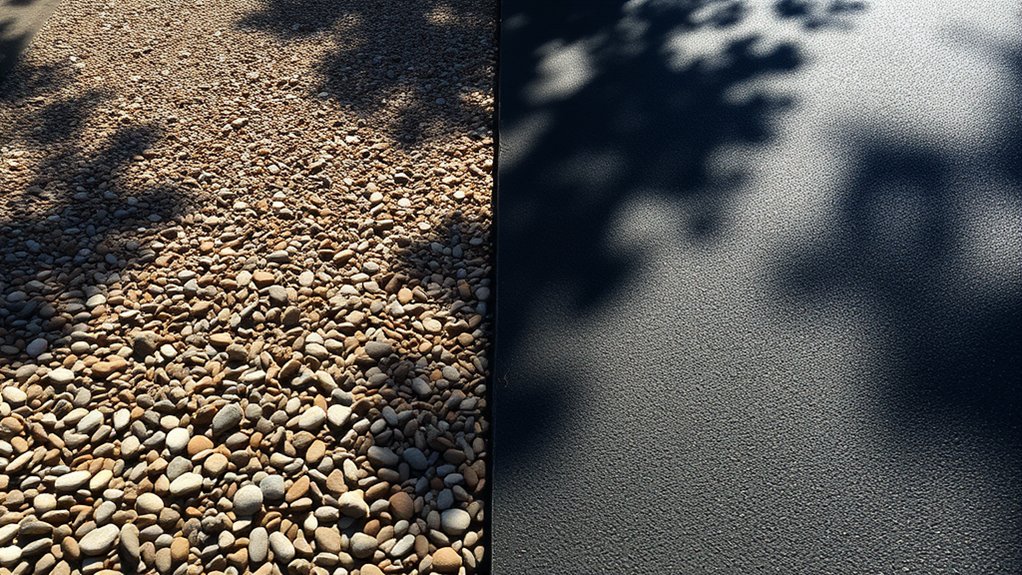
Safety Features: Slip Resistance and Temperature Performance
When choosing between resin-bound gravel and tarmac, safety features make a crucial difference.
- Anti-slip qualities: Resin-bound surfaces provide excellent grip, much like a well-textured garden path.
- Heat handling: Resin stays firm in summer heat (up to 200°C), whilst tarmac can soften on hot days (around 50°C).
- Wet weather grip: Resin maintains its non-slip properties in rain, unlike tarmac which can become rather slippery.
- Upkeep: Resin needs minimal maintenance to stay safe, whereas tarmac often requires patching and repairs.
- Safety over time: Resin's robust nature prevents water puddles and green growth, keeping your driveway safer year-round.
Environmental Impact and Sustainability
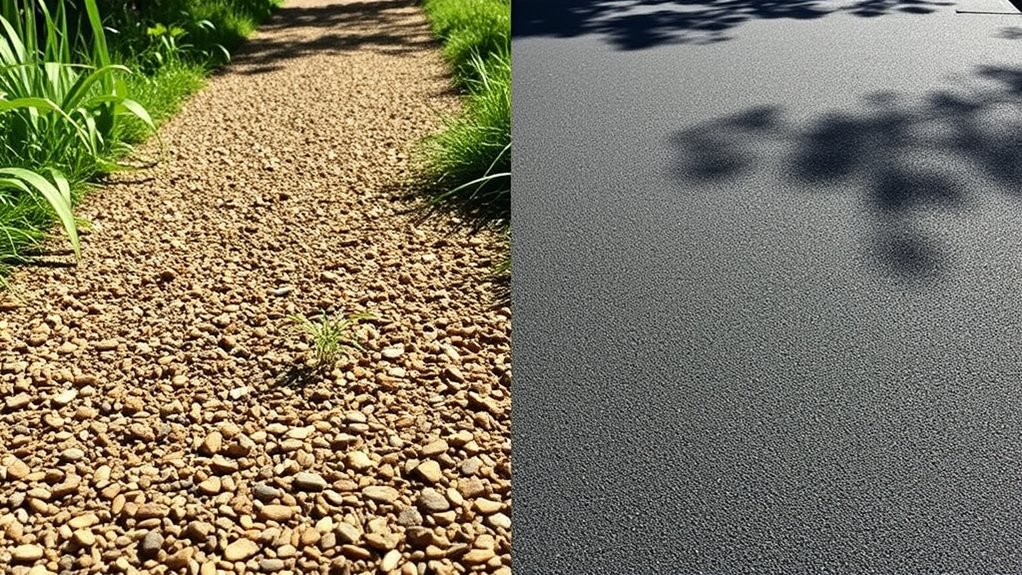
The environmental impact of your driveway surface choice matters more than you might think.
Resin-bound gravel, which combines natural stone with resin, offers better sustainability credentials than traditional options. It allows rainwater to drain naturally through the surface, meeting UK planning regulations for sustainable drainage (SuDS) and helping top up local groundwater levels.
Whilst tarmac proves tough and reliable, its non-permeable nature means you'll need extra drainage solutions. It also releases harmful chemicals during manufacturing.
Both materials use finite resources, but resin-bound surfaces typically last longer and require less energy to produce than tarmac.
When weighing up options, consider that resin-bound driveways tick both practical and environmental boxes – proper drainage, lower pollution and reduced flood risk.
It's a sensible choice for eco-conscious homeowners who don't want to compromise on quality.
Maintenance Requirements for Both Materials
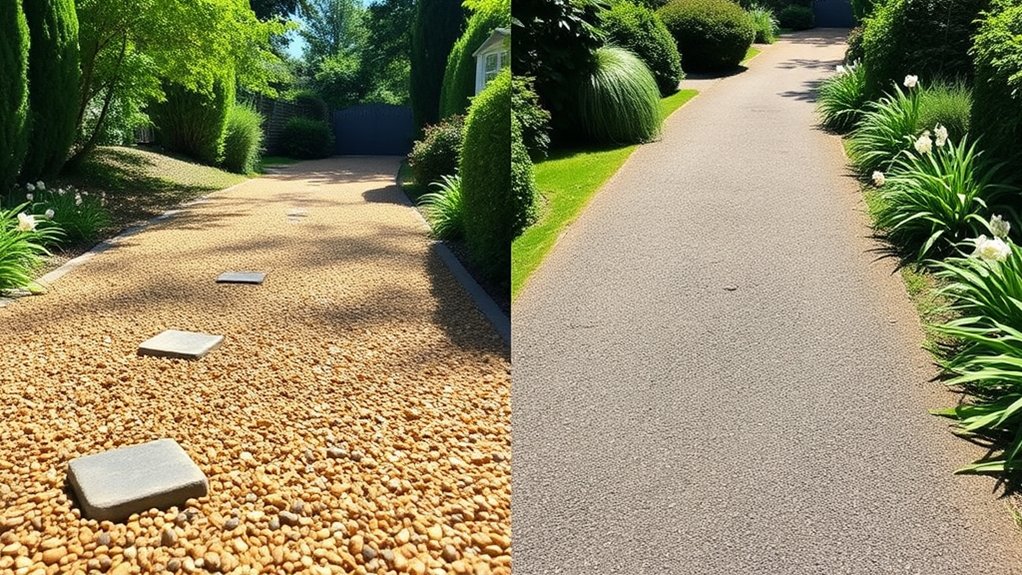
Maintenance needs differ between resin-bound gravel and tarmac driveways.
Resin surfaces need minimal upkeep – just occasional brushing and pressure washing to remove debris and prevent moss growth.
Tarmac requires more attention, including yearly sealing to guard against weather damage and swift repairs if cracks appear. A tarmac drive left unchecked can develop potholes, particularly after harsh winters, whilst resin surfaces tend to maintain their integrity longer.
Consider these maintenance demands when choosing your driveway material.
Long-Term Maintenance Needs
Choosing Between Resin-Bound Gravel and Tarmac: Maintenance Guide
Both surfacing options need different levels of upkeep over the years. Consider these key maintenance points:
Resin-bound gravel:
- Minimal yearly maintenance
- Occasional jet washing keeps it looking fresh
- Rarely needs major repairs
- Good value over time
Tarmac:
- Needs regular sealing every 3-5 years
- More prone to cracks in harsh weather
- Higher long-term repair costs
- Stands up well to heavy vehicles
Practical differences:
- A resin driveway typically lasts 15-20 years with basic care
- Tarmac might need significant work after 10-15 years
- Both need professional fitting for best results
- Resin uses recycled materials, making it more eco-friendly
The initial cost for resin is higher, but lower maintenance needs often make it more cost-effective long-term.
Cleaning and Upkeep
Regular cleaning is essential for both resin-bound gravel and tarmac driveways. For resin-bound surfaces, simply sweep regularly and wash with low-pressure water.
Tarmac is more robust and needs less frequent cleaning. Check both surfaces occasionally for stains and moss, particularly on resin-bound gravel.
Whilst tarmac is fairly low-maintenance, resin-bound surfaces need more attention, including gentle water rinsing to prevent wear.
For cleaning products, use mild soap on resin-bound surfaces – strong chemicals will damage them. Tarmac can cope with tougher cleaners, but never use a pressure washer on resin-bound driveways as it'll dislodge the stones.
Following these basic maintenance steps will keep both types of driveway looking smart for years to come.
Repair and Resealing Requirements
Repair and Resealing Requirements
Proper maintenance of resin-bound gravel and tarmac driveways demands different levels of attention and care:
Resin-bound surfaces:
- Rarely need resealing
- Maintain their bond well over time
- Less prone to damage than traditional surfaces
Tarmac:
- Needs regular resealing (typically every 3-5 years)
- Prone to damage from harsh British weather
- Common issues include potholes and surface cracks, particularly after winter
- Resealing process can be messy and disruptive
The choice between materials comes down to maintenance preference.
Resin-bound surfaces cost more upfront but require minimal upkeep, whilst tarmac is cheaper initially but demands ongoing attention and repairs.
Think about your driveway's daily use – for instance, if you regularly park heavy vehicles, resin-bound surfaces offer better long-term durability.
Traffic Handling and Load-Bearing Capacity
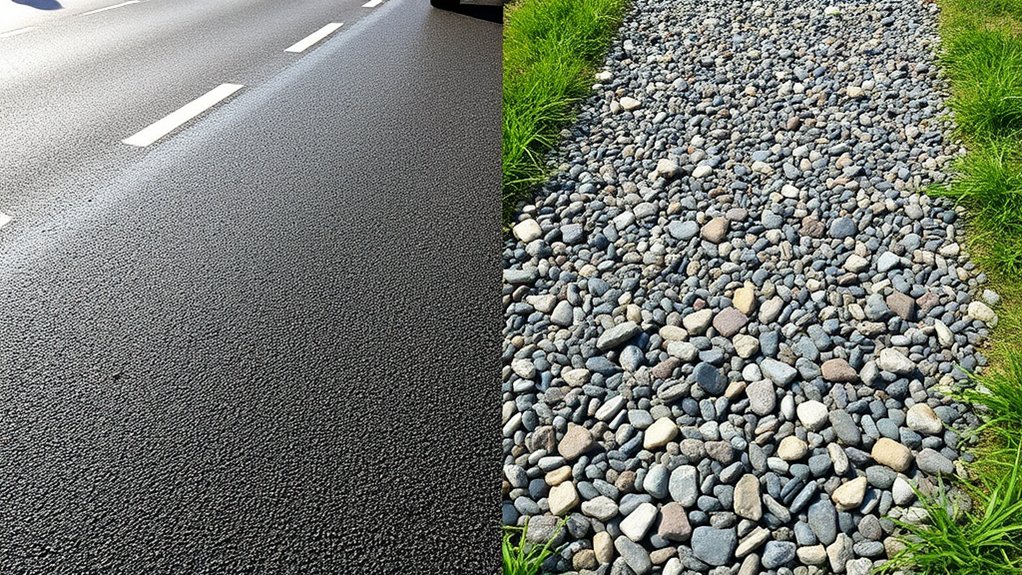
Resin-bound gravel and tarmac handle traffic loads quite differently.
Tarmac's solid surface copes well with heavy traffic and offers smooth driving, though it tends to crack in cold weather and turn soft during hot spells.
Resin-bound gravel, whilst better suited to moderate traffic, holds up remarkably well under vehicle weight and won't crack as easily.
Think of a busy supermarket car park – you'll often spot patches of damaged tarmac that need fixing, whereas resin-bound surfaces in residential driveways typically stay intact for longer.
The flexible nature of resin-bound gravel means it adapts better to ground movement, making it a practical choice for homeowners looking for a durable, low-maintenance option.
Visual Appeal and Property Value Enhancement
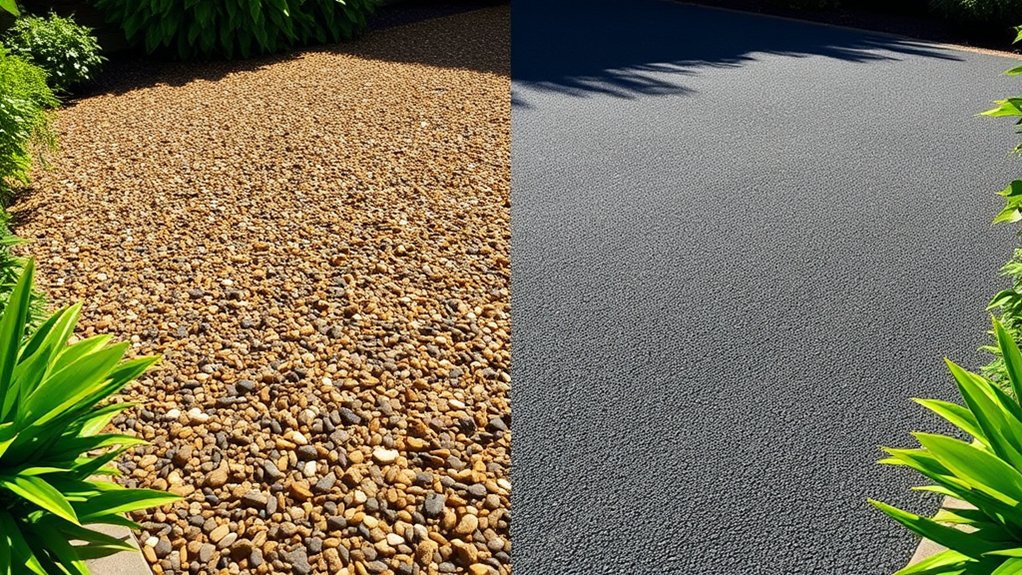
Visual Impact on Property Value
Choosing between resin-bound gravel and tarmac often comes down to more than just durability. The visual aspects can significantly affect your property's kerb appeal and value.
Resin-bound surfaces offer clear advantages:
- Colour Range: Pick from countless shades to match your house and garden
- Smart Finish: Creates a modern, upmarket look
- Natural Drainage: No puddles or flooding, keeping the drive looking tidy
- Bespoke Designs: Add borders or patterns to suit your taste
- Lasting Looks: Maintains its colour and smooth finish for years
Tarmac, whilst practical, tends to look rather basic and adds little to a property's visual appeal.
For homeowners keen to boost their property value, resin-bound gravel typically offers better returns on investment through its superior aesthetics.
Making the Right Choice for Your Needs
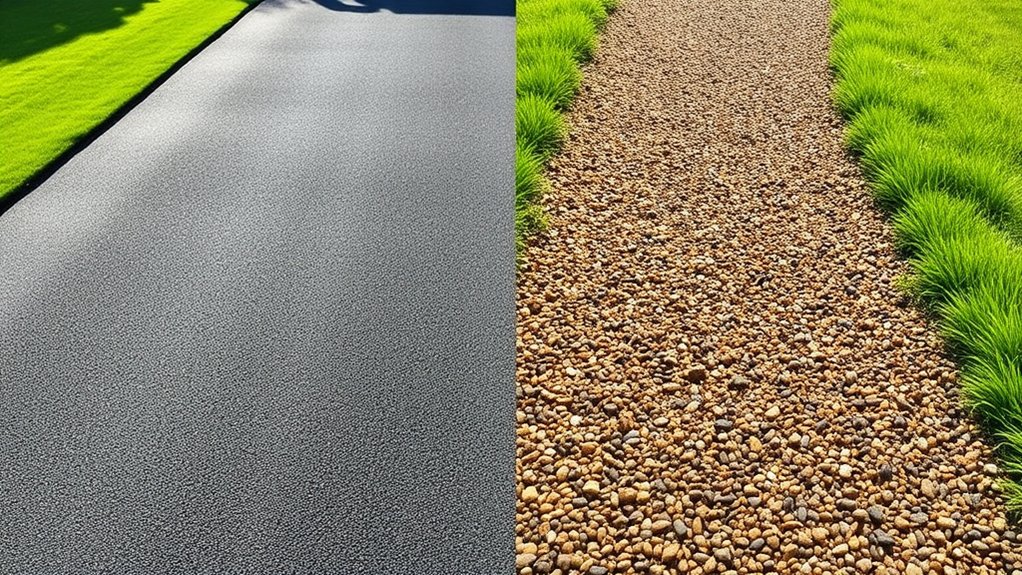
Choosing Between Resin and Tarmac
Resin surfaces offer clear advantages – they're tough, need little maintenance and can last two decades.
Whilst tarmac might seem cheaper initially, it cracks easily and needs regular resealing, much like maintaining an old garden fence.
Think about your priorities.
Need a quick fix? Tarmac's faster to lay, but don't forget the extensive groundwork needed beforehand.
Living in rainy Britain? Resin's excellent drainage and grip make it safer in wet weather, unlike tarmac which can become slippery and soft during summer heatwaves.
Consider the long-term picture.
Resin costs more upfront but needs little attention over its lifetime.
Tarmac's cheaper initially but requires ongoing maintenance, rather like painting a wooden deck every few years.
Your choice should match your budget, time and practical needs.
A busy family driveway might benefit from resin's durability, whilst a small garden path might work fine with tarmac.
Frequently Asked Questions
How Do Resin-Bound Gravel and Tarmac Compare in Extreme Weather Conditions?
Resin-bound gravel stands up brilliantly to Britain's weather extremes, whilst tarmac tends to face more challenges. In summer heatwaves, tarmac can become sticky and soft – much like what you'd see on a melting playground surface. During winter freezes, it often becomes brittle and prone to cracking. Resin-bound surfaces maintain their structure and stability year-round, making them a more reliable choice for our unpredictable British climate.
Can I Install Resin-Bound Gravel Over Existing Tarmac Surfaces?
Resin-bound gravel can indeed be laid over existing tarmac surfaces, provided the base is stable and in good nick. Before installation, your tarmac needs a thorough clean and check for cracks or major damage. Think of it like painting a wall – you'd want a solid, clean surface first. A properly prepared tarmac base helps create a lasting finish that won't just look smart but will stand up to British weather for years to come.
How Do I Clean and Maintain Resin-Bound Gravel Surfaces?
Regular sweeping and occasional pressure washing keep resin-bound gravel surfaces in top condition. Brush away leaves and debris weekly with a stiff-bristled broom to prevent dirt build-up. For stubborn marks like oil spots or bird droppings, scrub with a mild detergent solution immediately. In autumn, remove fallen leaves promptly to avoid staining. A yearly deep clean with a pressure washer on a low setting maintains the surface's appearance. Check regularly for any weed growth, particularly around the edges, and remove them before roots can establish.
What Are the Best Uses for Resin-Bound Gravel Versus Tarmac?
Resin-bound gravel proves ideal for residential driveways and garden paths, offering a smart, upmarket finish that suits British homes. Tarmac, meanwhile, remains the top choice for high-traffic areas like public car parks and access roads, thanks to its lower cost and quick installation. The choice largely depends on your priorities: kerb appeal versus practicality.
Is Resin-Bound Gravel Suitable for Driveways With Heavy Vehicles?
Resin-bound gravel driveways, when properly installed, cope well with heavy vehicles. The key lies in proper base preparation – typically a solid sub-base of MOT Type 1 aggregate and a reinforced concrete layer. With this foundation, the surface can handle cars, vans and occasional lorry traffic without cracking or sinking. The system's strength comes from its permeable yet solid structure, making it both practical and visually appealing for British homes.
Conclusion
When choosing between resin-bound gravel and tarmac, each option offers distinct advantages for your driveway. Resin-bound gravel provides an attractive, permeable surface that comes in various colours and textures, making it ideal for homeowners looking to enhance their property's kerb appeal. Tarmac, whilst less decorative, remains a practical choice that offers excellent value for money and proven longevity.
Consider your priorities: resin-bound surfaces cost more initially but require minimal upkeep and prevent puddles through natural drainage. Tarmac, common on British driveways, handles heavy use well and can be repaired easily if damaged. Your choice might depend on factors like budget, local planning requirements and how you use your driveway.
